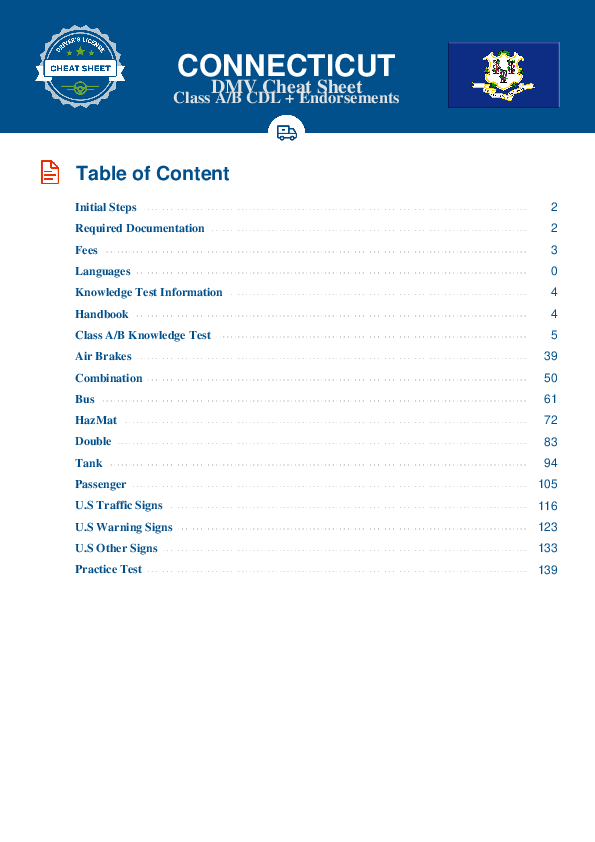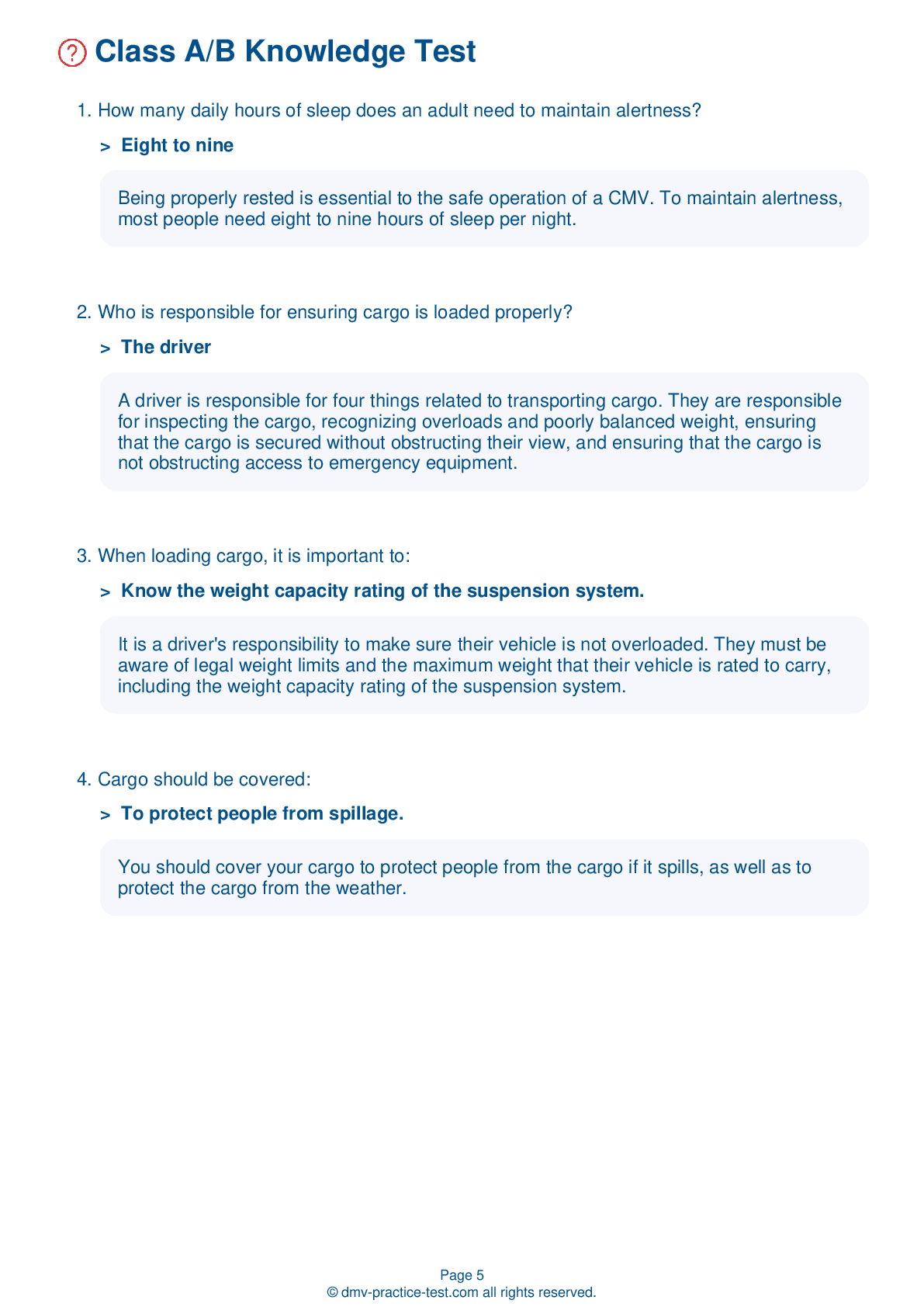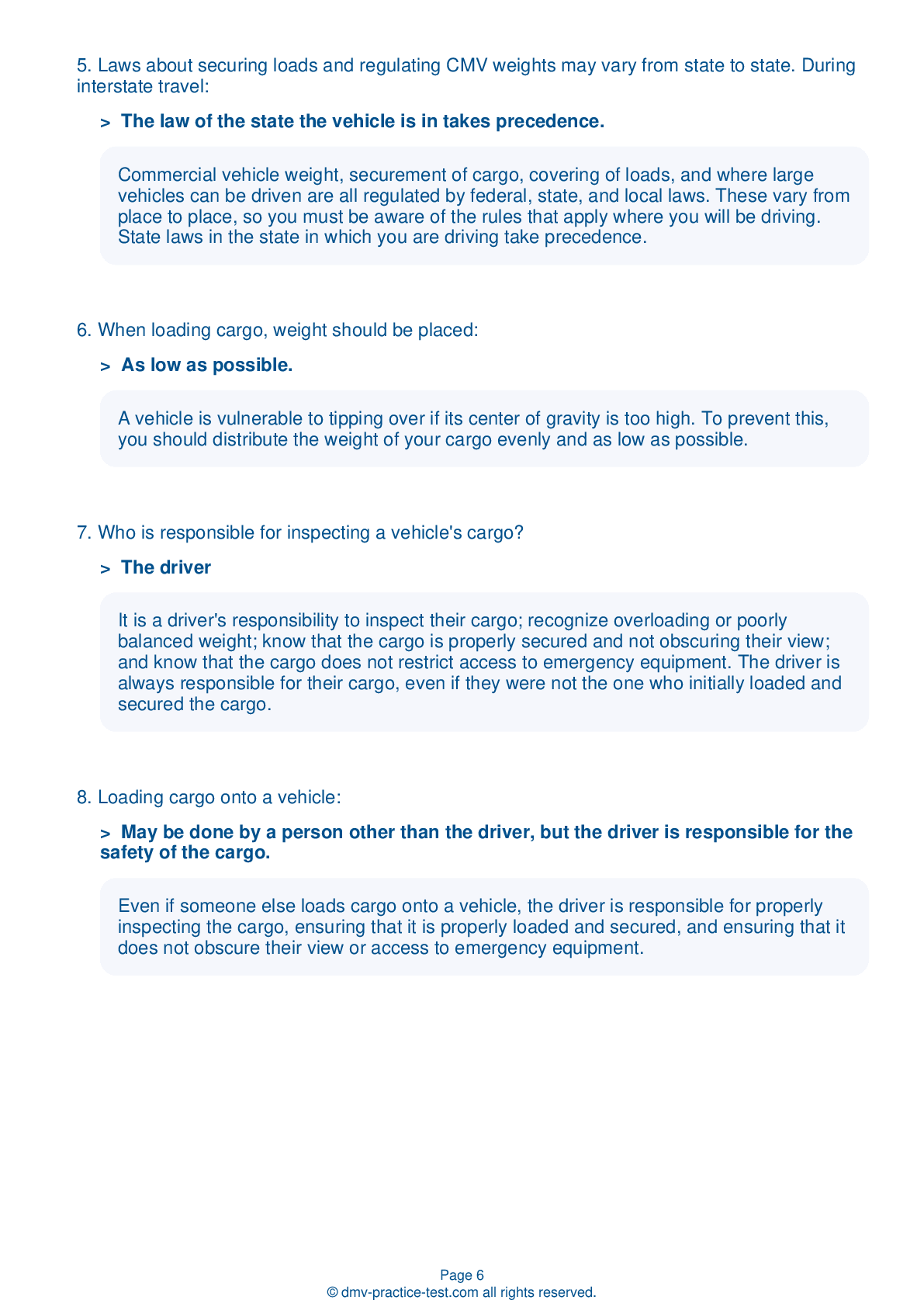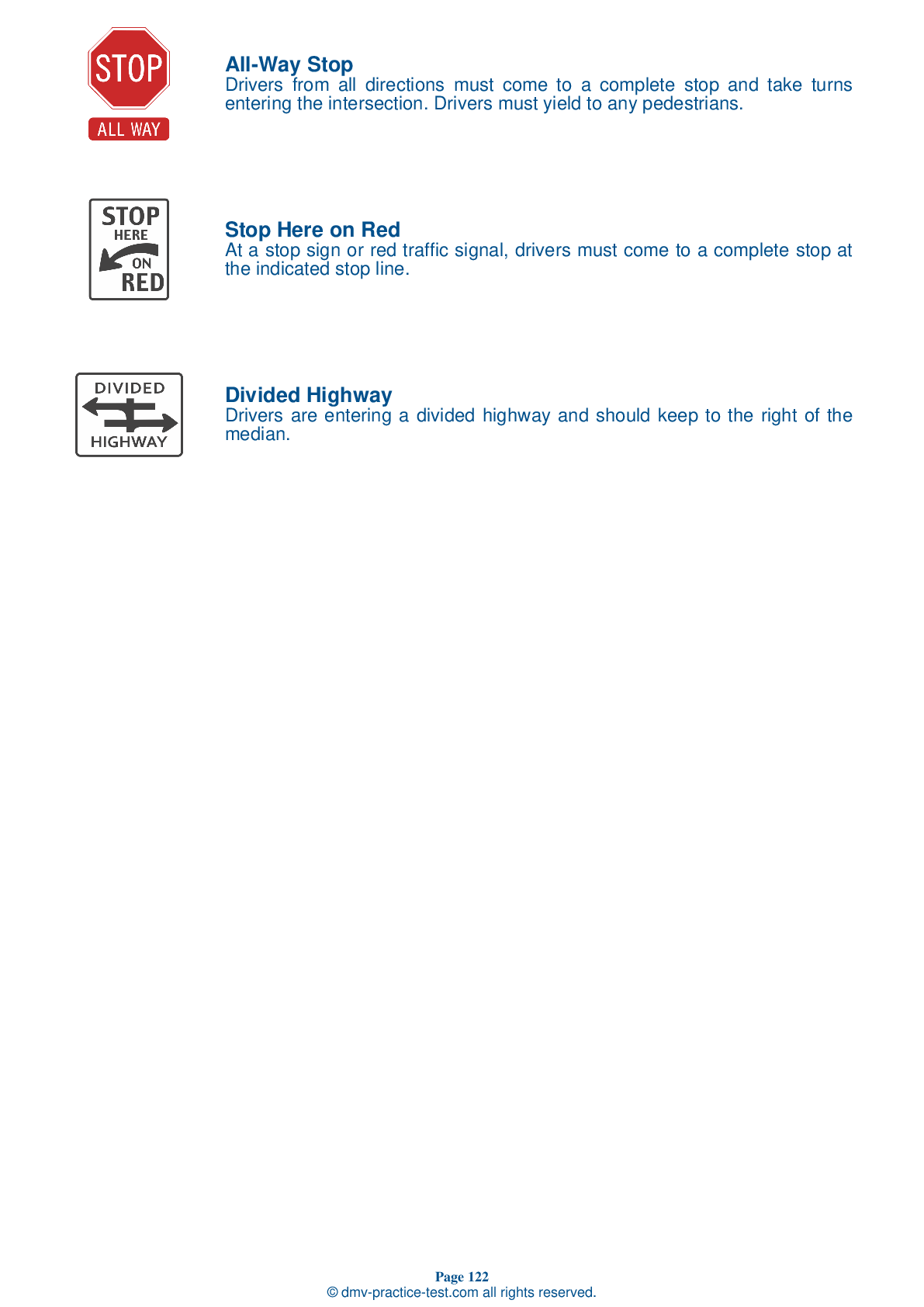Passenger #2
Passenger Endorsement | Connecticut 2026 #2 Page 2 of 3
Train for FREE with our Connecticut CDL passenger endorsement practice test online. The official exam test consists of several obligatory parts, with all of them checking your knowledge of different blocks of road rules. If you need to obtain a CT DMV passenger endorsement in 2026, practice as much as possible. Free sample tests published on our website will help you check and improve your knowledge and boost your grades. Please bear in mind that DMV requirements for issuing a CDL permit with passenger endorsement may vary from state to state.
20
16
20
8 . Alcohol is removed from the body:
More quickly if the person stays awake.
The liver removes alcohol from the body at a fixed rate that cannot be accelerated through common tricks, such as drinking coffee or taking a cold shower. The only way to sober up after drinking is to give your body the time it requires to process the alcohol out of your system.
9 . Emergency roof hatches on a bus:
On a bus, it is permissible to lock some emergency roof hatches in an open position to allow in fresh air. However, this should not be a regular practice.
10 . A vehicle should be equipped with all of the following, except:
A spotlight.
Commercial vehicles should always carry the proper emergency equipment. Be sure your vehicle is equipped with at least one fire extinguisher; spare electrical fuses, unless the vehicle is equipped with circuit breakers; and warning devices for parked vehicles, such as warning triangles, fuses, or liquid burning flares.
11 . If feeling sleepy while driving, you should:
Take an energy pill.
If you begin to feel sleepy while driving, the only safe response is to stop driving and get some sleep. Attempting to fight off exhaustion is dangerous and a major cause of fatal crashes. Stimulants are not a safe solution because they may help keep you awake but will not make you more alert. Once stimulants wear off, you will be even more tired than you were originally.
12 . When exiting a vehicle, it is important to maintain ____ with your vehicle at all times.
As you exit your vehicle during the basic vehicle control skills test, you must face the vehicle and maintain three points of contact at all times. If your testing vehicle is a bus, you must maintain contact with the handrail. Exiting the vehicle incorrectly may result in automatic failure of the basic control skills test.
13 . When approaching a railroad crossing while operating a bus, you should:
A bus driver should stop between 15 and 50 feet before any railroad crossing and check for trains before proceeding across the tracks. The driver may open the door to improve their ability to see or hear any approaching trains.
14 . When conducting a vehicle inspection, you must show each of the following, except:
That the oil pressure gauge comes on when brakes are used.
When checking the oil pressure gauge as part of a vehicle inspection test, you must ensure that it is working. The gauge should show increasing or normal oil pressure, or the oil pressure warning light should turn off. If equipped with one, the oil temperature gauge should begin a gradual rise to the normal operating range.
2026 Connecticut | Frequently Asked Questions
To secure a CDL Bus endorsement in Connecticut, you must first have a Commercial Driver's License (CDL). Then, pass the Passenger Endorsement Knowledge Test and the School Bus Endorsement Knowledge Test. Following this, complete a state and federal background check. Lastly, pass the Skills Test in a school bus of the appropriate class. Training may be required before testing.
To obtain a CDL Bus license in Connecticut, you need to have a valid driver's license, pass the CDL general knowledge test, and the Passenger Transport test. You must also pass a physical examination, provide proof of residency and identity, and pass a driving skills test in the type of vehicle you wish to be licensed for.
Yes, specific training is necessary for a CDL Bus endorsement in Connecticut. You must complete a bus-specific training program, which includes classroom instruction and behind-the-wheel training. The program covers topics such as passenger loading and unloading, emergency procedures, and bus inspection. After training, you must pass both knowledge and skills tests.
CDL Bus licenses in Connecticut fall into three classifications: Class A, B, and C. Class A is for combination vehicles like tractor-trailers. Class B is for single or combination vehicles like buses, dump trucks, or tow trucks. Class C is for transporting 16 or more passengers or hazardous materials. Each class requires specific tests and may require additional endorsements.
No, you cannot use your personal vehicle for the CDL Bus driving test in Connecticut. The vehicle used for testing should represent the type and class of bus you plan to drive. It must meet all safety standards and be properly registered and insured. This ensures you demonstrate appropriate skills for the specific type of commercial vehicle.
During the CDL Bus driving test in Connecticut, you'll be evaluated on skills such as vehicle inspection, controlling the vehicle, shifting gears, parallel parking, and making proper turns. Additionally, you'll be assessed on interacting with traffic, managing speed and space, and handling emergencies or hazardous conditions.
Yes, to obtain a CDL Bus endorsement in Connecticut, applicants must pass a Department of Transportation (DOT) physical exam every two years. The exam assesses vision, hearing, blood pressure, and overall physical health. Additionally, you must be free from any condition that could affect your ability to safely operate a vehicle, such as epilepsy or severe heart conditions.
No, it's not permissible to transport passengers without a valid CDL Bus endorsement in Connecticut. This endorsement is required for drivers who wish to operate a vehicle designed to carry 16 or more passengers, including the driver. Driving such a vehicle without the appropriate endorsement can result in serious penalties, including fines and suspension of your license.
In Connecticut, the CDL Bus endorsement can be added to your existing CDL. You don't need to apply for a new license. However, you'll need to pass the Passenger Endorsement Knowledge Test and the Skills Test in a vehicle representative of the class of bus you wish to drive. It's important to check with the DMV for specific requirements.
Yes, there are limitations. Drivers with a CDL Bus endorsement in Connecticut must adhere to the Federal Motor Carrier Safety Regulations. They must not have any serious traffic violations, cannot drive under the influence of drugs or alcohol, and must maintain a clean driving record. Additionally, they must pass a physical exam every two years to ensure they're medically fit to operate a bus.



